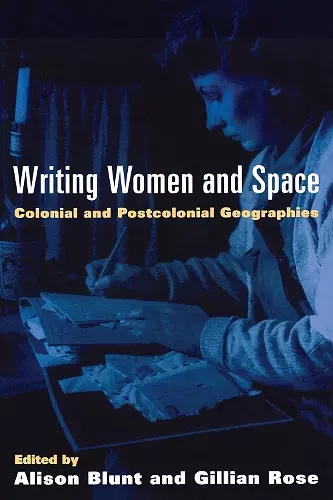Writing Women and Space
Colonial and Postcolonial Geographies
Gillian Rose editor Alison Blunt editor
Format:Paperback
Publisher:Guilford Publications
Published:31st Oct '94
Currently unavailable, and unfortunately no date known when it will be back

Drawing lessons from the complex and often contradictory position of white women writing in the colonial period, This unique book explores how feminism and poststructuralism can bring new types of understanding to the production of geographical knowledge. Through a series of colonial and postcolonial case studies, essays address the ways in which white women have written and mapped different geographies, in both the late nineteenth century and today, illustrating the diverse objects (landscapes, spaces, views), the variety of media (letters, travel writing, paintings, sculpture, cartographic maps, political discourse), and the different understandings and representations of people and place.
...is a useful contribution to the literature on gender perspectives of the colonized world... --Helen Ruth Aspaas, African Studies Review
...presents compelling ways of bringing together ideas from poststructuralist and postcolonial theory around geographical questions, and provides much material, both for those working within a similar intellectual territory, and for those grappling with more general methodological questions. I should find its place on many reading lists, if it has not already done so, as it provides an accessible contribution to contemporary debates around identity, space, and power. -- R. Elmhirst, Wye College University of London, Environment and Planning A
This timely collection of essays explores ways in which feminism, space, and the politics of identity, subjectivity, and representation come together in diverse colonial and postcolonial settings....I unhesitatingly invite colleagues and students across disciplines to read this fresh and imaginative collection of essays.... --Karen Morin, Growth and Change
As edited volumes go, this is a remarkably coherent (and successful) one.... This book makes an important contribution to feminist geography. --Geraldine Pratt, University of British Columbia
This is a superb new contribution to the literature on space, power and difference. In drawing together an exciting range of well-researched essays, it articulates the complex relations between gender, class, race and sexuality in different historical and geographic settings. With an emphasis on diversities among women and the contexts within which they occur, it is particularly effective in highlighting the fragmented, fluid and often contradictory nature of identity and space. --Morag Bell, Ph.D., Loughborough University of Technology
Although I don't always see eye to eye with the authors in this volume, I warmly welcome this set of essays on women's colonial and post-colonial cartographics. For here we have a feisty feminist geography that is theoretically self-critical, empirically vigorous, and morally challenging....One thing is certain: coming to grips with this critique will lay upon readers an obligation; an obligation to expose the pretended innocence of the metaphorical and material maps we have historically produced...and the maps we currently plot. --David N. Livingstone, Professor of Geography, The Queen's University of Belfast
This is an important, path-breaking collection of essays. In highlighting the complicities and resistances of white women to imperial discourses, the book speaks to wider epistemological issues about human subjectivity. In different ways, the chapters demonstrate the inherent partiality, instability, positionality, and situatedness of subjectivity. By extension, conventional notions of space are unsettled in a powerful acknowledgment of our gendered imaginaries. This leads us to re-imagine space and mapping in fresh ways. --Kay Anderson, Ph.D., Senior Lecturer in Geography, University of New South Wales and author of the award-winning Vancouver's Chinatown: Racial Discourse in Canada, 1875-1980
This is an important, path-breaking collection of essays. In highlighting the complicities and resistances of white women to imperial discourses, the book speaks to wider epistemological issues about human subjectivity. In different ways, the chapters demonstrate the inherent partiality, instability, positionality, and situatedness of subjectivity. By extension, notions of transcendent, coherent space are unsettled in a powerful acknowledgment of our gendered imaginaries. This leads us to reimagine space and mappings in fresh ways. --Kay Anderson, Ph.D., Senior Lecturer in Geography, University of New South Wales and author of the award-winning Vancouver's Chinatown: Racial Discourses in Canada, 1875-1980
- This timely collection of essays explores ways in which feminism, space, and the politics of identity, subjectivity, and representation come together in diverse colonial and postcolonial settings....I unhesitatingly invite colleagues and students across disciplines to read this fresh and imaginative collection of essays.... --Growth and Change, 8/21/1994
ISBN: 9780898624984
Dimensions: unknown
Weight: 400g
268 pages